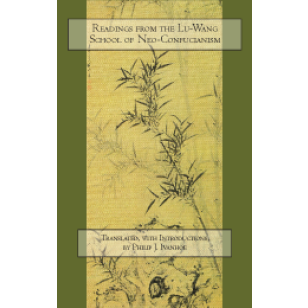Readings from the Lu-Wang School of Neo-Confucianism
This volume provides selected translations from the writings of Lu Xiangshan; Wang Yangming; and the Platform Sutra, a work which had profound influence on neo-Confucian thought. Each of these three sections is preceded by an introduction that sketches important features of the history, biography, and philosophy of the author and explores some of the main features and characteristics of his work. The range of genres represented—letters, recorded sayings, essays, meditations and poetry—provide the reader with insights into the philosophical and stylistic themes of this fascinating and influential branch of neo-Confucian thought.
eBook available for $15.50. Click HERE for more information.
This volume provides selected translations from the writings of Lu Xiangshan; Wang Yangming; and the Platform Sutra, a work which had profound influence on neo-Confucian thought. Each of these three sections is preceded by an introduction that sketches important features of the history, biography, and philosophy of the author and explores some of the main features and characteristics of his work. The range of genres represented—letters, recorded sayings, essays, meditations and poetry—provide the reader with insights into the philosophical and stylistic themes of this fascinating and influential branch of neo-Confucian thought.
Reviews:
"From Tang Buddhism through the Confucianism of the next one thousand years, in various forms, one idea was central: insights that can inform a good life come not from learning but from a pure, 'original nature' shared by all people.
"Distinctive among works on Chinese thought, Ivanhoe's book identifies not only core teachings of three famous figures who worked with this idea, but also the style of the words and personal character traits by which they conveyed their views to disciples. It is based on high quality research, with helpful introductory and explanatory comments on the different works. The prose is crisp and clear. It is also a pleasure to read because, though Huineng, Lu Xiangshan, and Wang Yangming lived long ago, this work keeps those sages alive. In it, the reader feels their interaction not only with their fellow monks or with fellow neo-Confucians but also with Ivanhoe's audience today."
—Donald J. Munro, University of Michigan
"Philip J. Ivanhoe has provided a bravura set of selected translations that are scholarly and readable from the great Lu-Wang School of the neo-Confucian philosophical revival of the Song-Ming dynasties—and as a bonus he has also included a selection from the Platform Sutra of the Chan (Zen) Buddhist tradition.
"Ivanhoe makes lucidly clear the great debt that the Lu-Wang branch of neo-Confucianism owed to the Chan school. His introductions are models of concise explanation of why these great Chinese thinkers are as important today for global philosophy as when they lived and taught in Tang, Song, and Ming China. There is simply no better introduction to the Lu-Wang School than this judicious selection of diverse key philosophical and literary works of Huineng, Lu, and Wang."
—John Berthrong, Boston University
“Readings from the Lu-Wang School reflects a deep philosophical understanding of the two philosophers’ views, and a comprehensive knowledge of the tradition of Chinese philosophy. The translated text is accompanied by helpful introductions to each philosopher and detailed scholarly notations. These, along with the elegant translation and representative selections of the text, make this book the authoritative edition of the Lu-Wang works in English.
“Ivanhoe’s selections are more comprehensive than Chan’s Source Book. . . . Chan’s selection . . . amounts to scanty paragraphs or remarks out of context, while Ivanhoe places his selections in their original context by covering a major part of each piece. . . .
“In comparing Ivanhoe’s Readings to the original Chinese texts, I was often struck by the ingenious choice of words that Ivanhoe makes. . . . He does not rigidly use the same word to translate the same Chinese character, since he understands that Chinese characters take on different meanings in different contexts.
“One of the best features of this book is the detailed notations, which sometimes give helpful background for a particular passage, sometimes cite the literary source of a particular phrase, and sometimes biographically sketch people referenced in the text. Such notations are indispensable for readers not thoroughly familiar with Chinese classics.
“Ivanhoe’s Readings is a highly commendable translation of Lu Xiangshan’s and Wang Yangming’s works. It gives good coverage of their philosophical views and literary styles, and can be used as a reliable sourcebook for the Lu-Wang School. This book can be used for any course on Neo-Confucianism.”
—JeeLoo Liu, California State University at Fullerton, in Philosophy East & West
“Ivanhoe's translations are amazingly clear and unaffected either by contemporary slang or by academic stiffness. His introductions and commentaries are straightforward, saying directly what they mean without multiple qualifying clauses stuck between important ideas. . . . One of the delights of his volume is his introductions to the three main sets of texts . . . and his interpretive comments on each of the individual texts are so simple and intelligible—a remarkable achievement in light of the foreignness of these texts to most Western readers. Another even more important delight is his philosophy of footnoting. . . . His enormous erudition allows him to cite other translations and interpretations with uncommon generosity. He has done the painstaking work of looking up and explaining all the obscure references in the texts—who would have thought!"
—Robert C. Neville, Boston University, in International Journal for Philosophy of Religion
About the Author:
Philip J. Ivanhoe is Reader-Professor of Philosophy, City University of Hong Kong.





